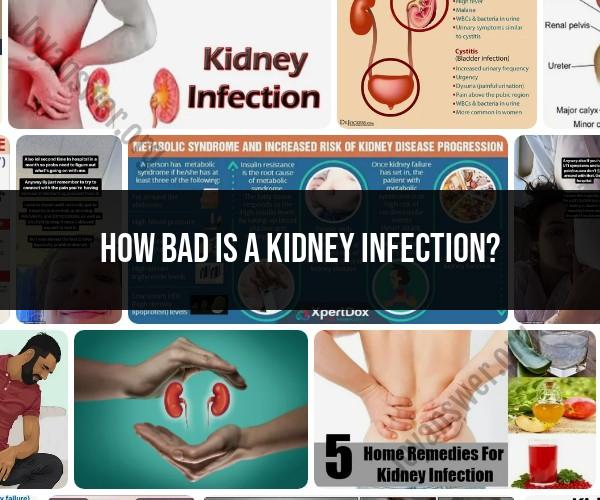How bad is a kidney infection?
A kidney infection, also known as pyelonephritis, is a potentially serious medical condition that should not be taken lightly. The severity of a kidney infection can vary from mild to severe, and its impact can depend on several factors, including the promptness of treatment, the individual's overall health, and the presence of any complications. Here are some key points to understand about the severity of kidney infections:
Potentially Serious Condition: Kidney infections are considered a more severe form of urinary tract infection (UTI). They occur when bacteria from a UTI travel from the bladder to the kidneys. If left untreated or not treated promptly, kidney infections can lead to serious health issues.
Symptoms: The severity of symptoms can vary among individuals. Common symptoms of a kidney infection include fever, severe back or flank pain, frequent and painful urination, blood in the urine, nausea, and vomiting. Some people may experience mild symptoms, while others may have more severe and debilitating symptoms.
Complications: If not treated, kidney infections can lead to complications, including kidney damage, kidney scarring, or the formation of abscesses (collections of pus) in the kidneys. These complications can have long-term consequences on kidney function.
Systemic Infection (Sepsis): In severe cases, a kidney infection can lead to sepsis, which is a life-threatening condition characterized by the body's extreme response to infection. Sepsis can cause a drop in blood pressure, confusion, organ failure, and, in extreme cases, death. Prompt treatment is critical to prevent sepsis.
Treatment: Kidney infections are typically treated with antibiotics, which are effective in most cases. However, the choice of antibiotic and the duration of treatment may vary depending on the severity of the infection and individual factors.
Prompt Medical Attention: If you suspect you have a kidney infection, it's important to seek medical attention promptly. Early diagnosis and treatment can prevent the infection from worsening and reduce the risk of complications.
Follow-Up Care: After treatment, it's important to follow your healthcare provider's instructions, take the full course of antibiotics, and attend any follow-up appointments. This helps ensure that the infection is completely cleared and reduces the risk of recurrence.
In summary, while kidney infections can vary in severity, they should be taken seriously and treated promptly. Timely medical intervention is essential to prevent complications and minimize the impact of the infection on kidney health. If you suspect you have a kidney infection or experience symptoms such as fever, severe pain, or urinary symptoms, contact a healthcare provider for evaluation and treatment.
The Impact of Kidney Infections: Assessing Severity
Kidney infections are a type of urinary tract infection (UTI) that occurs in the kidneys. They can be caused by bacteria that travel up the urethra and into the bladder and kidneys. Kidney infections can be painful and serious, and the severity of the infection can vary.
Assessing the severity of a kidney infection
The severity of a kidney infection is assessed based on a number of factors, including:
- The type of bacteria causing the infection
- The severity of the symptoms
- The patient's age and overall health
- The patient's risk of complications
Mild kidney infections
Mild kidney infections can be treated with antibiotics at home. Patients with mild kidney infections may experience the following symptoms:
- Fever
- Chills
- Pain in the lower back or side
- Pain or burning when urinating
- Frequent urination
- Urgent need to urinate
Moderate kidney infections
Moderate kidney infections may require hospitalization. Patients with moderate kidney infections may experience the following symptoms:
- Severe fever
- Severe pain in the lower back or side
- Nausea and vomiting
- Difficulty urinating
- Bloody urine
Severe kidney infections
Severe kidney infections can be life-threatening. Patients with severe kidney infections may experience the following symptoms:
- High fever
- Severe pain in the lower back or side
- Nausea and vomiting
- Difficulty urinating
- Bloody urine
- Confusion (in older adults)
Complications of kidney infections
If left untreated, kidney infections can lead to serious complications, such as:
- Sepsis: A life-threatening condition that occurs when the body's immune system overreacts to an infection.
- Kidney damage: Kidney infections can damage the kidneys, which can lead to kidney failure.
- Kidney failure: A life-threatening condition that occurs when the kidneys are no longer able to filter waste products from the blood.
Conclusion
Kidney infections can be serious, but they are usually treatable with antibiotics. If you have any of the symptoms of a kidney infection, it is important to see a doctor right away. Early diagnosis and treatment can help to prevent complications.
Disclaimer: I am a large language model, also known as a conversational AI or chatbot trained to be informative and comprehensive. I am trained on a massive amount of text data, and I am able to communicate and generate human-like text in response to a wide range of prompts and questions. For example, I can provide summaries of factual topics or create stories.
However, I am not a medical professional, and I cannot provide medical advice. If you have any questions or concerns about your health, please consult with a doctor or other qualified healthcare provider.













